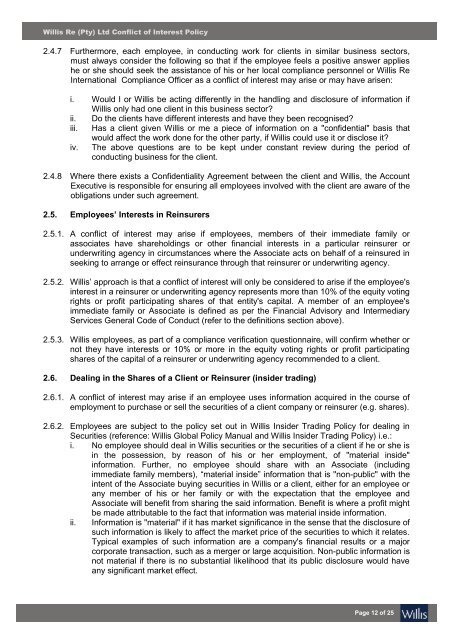CONFLICT OF INTEREST POLICY - Willis Re
CONFLICT OF INTEREST POLICY - Willis Re
CONFLICT OF INTEREST POLICY - Willis Re
You also want an ePaper? Increase the reach of your titles
YUMPU automatically turns print PDFs into web optimized ePapers that Google loves.
<strong>Willis</strong> <strong>Re</strong> (Pty) Ltd Conflict of Interest Policy<br />
2.4.7 Furthermore, each employee, in conducting work for clients in similar business sectors,<br />
must always consider the following so that if the employee feels a positive answer applies<br />
he or she should seek the assistance of his or her local compliance personnel or <strong>Willis</strong> <strong>Re</strong><br />
International Compliance Officer as a conflict of interest may arise or may have arisen:<br />
i. Would I or <strong>Willis</strong> be acting differently in the handling and disclosure of information if<br />
<strong>Willis</strong> only had one client in this business sector<br />
ii. Do the clients have different interests and have they been recognised<br />
iii. Has a client given <strong>Willis</strong> or me a piece of information on a "confidential" basis that<br />
would affect the work done for the other party, if <strong>Willis</strong> could use it or disclose it<br />
iv. The above questions are to be kept under constant review during the period of<br />
conducting business for the client.<br />
2.4.8 Where there exists a Confidentiality Agreement between the client and <strong>Willis</strong>, the Account<br />
Executive is responsible for ensuring all employees involved with the client are aware of the<br />
obligations under such agreement.<br />
2.5. Employees’ Interests in <strong>Re</strong>insurers<br />
2.5.1. A conflict of interest may arise if employees, members of their immediate family or<br />
associates have shareholdings or other financial interests in a particular reinsurer or<br />
underwriting agency in circumstances where the Associate acts on behalf of a reinsured in<br />
seeking to arrange or effect reinsurance through that reinsurer or underwriting agency.<br />
2.5.2. <strong>Willis</strong>’ approach is that a conflict of interest will only be considered to arise if the employee's<br />
interest in a reinsurer or underwriting agency represents more than 10% of the equity voting<br />
rights or profit participating shares of that entity's capital. A member of an employee's<br />
immediate family or Associate is defined as per the Financial Advisory and Intermediary<br />
Services General Code of Conduct (refer to the definitions section above).<br />
2.5.3. <strong>Willis</strong> employees, as part of a compliance verification questionnaire, will confirm whether or<br />
not they have interests or 10% or more in the equity voting rights or profit participating<br />
shares of the capital of a reinsurer or underwriting agency recommended to a client.<br />
2.6. Dealing in the Shares of a Client or <strong>Re</strong>insurer (insider trading)<br />
2.6.1. A conflict of interest may arise if an employee uses information acquired in the course of<br />
employment to purchase or sell the securities of a client company or reinsurer (e.g. shares).<br />
2.6.2. Employees are subject to the policy set out in <strong>Willis</strong> Insider Trading Policy for dealing in<br />
Securities (reference: <strong>Willis</strong> Global Policy Manual and <strong>Willis</strong> Insider Trading Policy) i.e.:<br />
i. No employee should deal in <strong>Willis</strong> securities or the securities of a client if he or she is<br />
in the possession, by reason of his or her employment, of "material inside"<br />
information. Further, no employee should share with an Associate (including<br />
immediate family members), “material inside” information that is "non-public" with the<br />
intent of the Associate buying securities in <strong>Willis</strong> or a client, either for an employee or<br />
any member of his or her family or with the expectation that the employee and<br />
Associate will benefit from sharing the said information. Benefit is where a profit might<br />
be made attributable to the fact that information was material inside information.<br />
ii. Information is "material" if it has market significance in the sense that the disclosure of<br />
such information is likely to affect the market price of the securities to which it relates.<br />
Typical examples of such information are a company's financial results or a major<br />
corporate transaction, such as a merger or large acquisition. Non-public information is<br />
not material if there is no substantial likelihood that its public disclosure would have<br />
any significant market effect.<br />
Page 12 of 25






